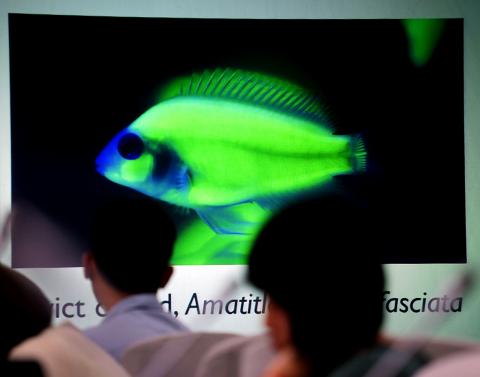The world’s largest glow-in-the-dark fish — about 12cm long — have been produced by Taiwanese researchers at Academia Sinica, with the cooperation of a tropical fish export company, and have gained patents for the critical technologies involved, the Ministry of Science and Technology said yesterday.
Funded by the ministry, the project was led by Chen Jyh-yih (陳志毅), an associate research fellow at Academia Sinica’s Marine Research Station.
Chen said the estimated global trade value of aquarium fish has reached about US$5 billion a year, with the annual output of aquarium fish exported from Taiwan at about NT$1 billion (US$3.32 million).

Photo: CNA
The world’s first fluorescent fish was produced in Taiwan in 2003 and was selected by Time magazine as one of the 40 coolest inventions of the year.
While it is more difficult to genetically modify bigger fish, the team succeeded in finding the suitable promoter — a sequence of DNA that initiates the transcription of a particular gene — from tilapia myosin and injected it into the eggs of the convict cichlid, along with pink fluorescent protein from a type of local coral.
The team produced the genetically modified fluorescent pink convict cichlid in 2012 and the double transgenic fluorescent green and pink convict cichlid, known as the peach princess, last year, Chen said, and also gained a patent for the DNA promoter after submitting an application in 2012.
However, because trading regulations and genetically modified organism guidelines differ in different countries, the fish cannot be commercially exported at present, he said, adding that a rough estimate is that the price of the fish could be about NT$80,000.
The cost of a normal convict cichlid is less than NT$100, he said.
In addition, Chen said that the fish not only have a huge potential market value, but also serve an educational purpose and their images can be made into creative products.

Chinese Nationalist Party (KMT) Chairman Eric Chu (朱立倫), spokeswoman Yang Chih-yu (楊智伃) and Legislator Hsieh Lung-chieh (謝龍介) would be summoned by police for questioning for leading an illegal assembly on Thursday evening last week, Minister of the Interior Liu Shyh-fang (劉世芳) said today. The three KMT officials led an assembly outside the Taipei City Prosecutors’ Office, a restricted area where public assembly is not allowed, protesting the questioning of several KMT staff and searches of KMT headquarters and offices in a recall petition forgery case. Chu, Yang and Hsieh are all suspected of contravening the Assembly and Parade Act (集會遊行法) by holding

PRAISE: Japanese visitor Takashi Kubota said the Taiwanese temple architecture images showcased in the AI Art Gallery were the most impressive displays he saw Taiwan does not have an official pavilion at the World Expo in Osaka, Japan, because of its diplomatic predicament, but the government-backed Tech World pavilion is drawing interest with its unique recreations of works by Taiwanese artists. The pavilion features an artificial intelligence (AI)-based art gallery showcasing works of famous Taiwanese artists from the Japanese colonial period using innovative technologies. Among its main simulated displays are Eastern gouache paintings by Chen Chin (陳進), Lin Yu-shan (林玉山) and Kuo Hsueh-hu (郭雪湖), who were the three young Taiwanese painters selected for the East Asian Painting exhibition in 1927. Gouache is a water-based

Taiwan would welcome the return of Honduras as a diplomatic ally if its next president decides to make such a move, Minister of Foreign Affairs Lin Chia-lung (林佳龍) said yesterday. “Of course, we would welcome Honduras if they want to restore diplomatic ties with Taiwan after their elections,” Lin said at a meeting of the legislature’s Foreign Affairs and National Defense Committee, when asked to comment on statements made by two of the three Honduran presidential candidates during the presidential campaign in the Central American country. Taiwan is paying close attention to the region as a whole in the wake of a

OFF-TARGET: More than 30,000 participants were expected to take part in the Games next month, but only 6,550 foreign and 19,400 Taiwanese athletes have registered Taipei city councilors yesterday blasted the organizers of next month’s World Masters Games over sudden timetable and venue changes, which they said have caused thousands of participants to back out of the international sporting event, among other organizational issues. They also cited visa delays and political interference by China as reasons many foreign athletes are requesting refunds for the event, to be held from May 17 to 30. Jointly organized by the Taipei and New Taipei City governments, the games have been rocked by numerous controversies since preparations began in 2020. Taipei City Councilor Lin Yen-feng (林延鳳) said yesterday that new measures by